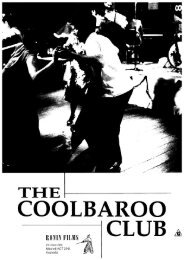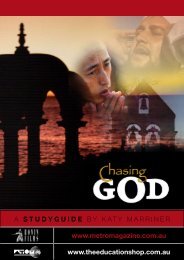to download BETELNUT BISNIS study guide - Ronin Films
to download BETELNUT BISNIS study guide - Ronin Films
to download BETELNUT BISNIS study guide - Ronin Films
Create successful ePaper yourself
Turn your PDF publications into a flip-book with our unique Google optimized e-Paper software.
outside Port Moresby, street theatre<br />
has been one way of communicating<br />
important public welfare notices.<br />
3. Law and Order<br />
While no violence and no raskols<br />
(members of criminal gangs) are seen<br />
on screen, there are visual and spoken<br />
references <strong>to</strong> law and order problems:<br />
the high fence around the houses<br />
where Chris Owen lives, the employment<br />
of guards, the talk of break-ins<br />
attempted, and Lukas’ praise of Madang’s<br />
safety compared with Lae and<br />
Goroka. Ordinary Papua New Guineans<br />
are often under threat of violence or<br />
robbery. The frequency of crime and<br />
fear of crime s<strong>to</strong>ps them doing what<br />
would be done elsewhere without a<br />
thought for personal security.<br />
4. The Australian Legacy<br />
At the market in Goroka, a man says<br />
that conditions were better when<br />
Australia was in control. As Papua New<br />
Guinea had full internal self-government<br />
from 1973, it seems unlikely that<br />
he is speaking from firsthand experience.<br />
Perhaps he is expressing what<br />
has become a romanticized version of<br />
the past. In any case, his point of view<br />
evades two important issues: could<br />
Australia have continued <strong>to</strong> control a<br />
more populous and increasingly turbulent<br />
Papua New Guinea, contain the<br />
civil war on Bougainville and suppress<br />
the revival of tribal fighting—something<br />
already underway before the Australians<br />
left And <strong>to</strong> what extent are the<br />
present problems in Papua New Guinea<br />
a result of Australia’s failure <strong>to</strong> entrench<br />
those institutions needed for the efficient<br />
functioning of a modern state<br />
This film is an engaging, often gentle<br />
exposition of ordinary lives—but<br />
the <strong>to</strong>ugh issues that come with any<br />
recreational drug (such as child users)<br />
and the broader national issues are not<br />
evaded.<br />
Music<br />
When groups meet in Papua New<br />
Guinea’s suburbs and villages there is<br />
usually music. It ranges from traditional<br />
drums, flutes and conch shells<br />
through makeshift string bands using<br />
aged and repaired guitars and ukuleles,<br />
<strong>to</strong> dependence on the most sophisticated<br />
sound technology. Both songs in<br />
Betelnut Bisnis—‘Sekim Pocket’ by the<br />
LBX2 band and ‘Buai Buai’ by Georgianna<br />
Toro—were written for the film.<br />
Chris Owen and the film team cooperated<br />
with LBX2, a band from Bilbil,<br />
Madang, in the production and lyrics<br />
of ‘Sekim Pocket’. Note the use of the<br />
melodious, simple percussion instrument—the<br />
bamboo pipes belted by<br />
a rubber thong. Like those going in<strong>to</strong><br />
the betelnut trade, the young men and<br />
women who form bands hope that one<br />
day they might have financial success.<br />
Georgianna Toro is a Bougainvillean<br />
woman now living in the Highlands.<br />
She is not a betelnut chewer. The LBX2<br />
men are all enthusiastic chewers and<br />
have their own palms. Chris Owen has<br />
tried betelnut, will give it <strong>to</strong> his Papua<br />
New Guinean guests, but has not himself<br />
acquired the habit.<br />
Before Viewing<br />
Before seeing Betelnut Bisnis students<br />
should be familiar with some of Papua<br />
New Guinea’s basic geography (the<br />
location of the Highlands, Goroka,<br />
Lae and Madang), its his<strong>to</strong>ry (the late<br />
extension of Australian administration<br />
<strong>to</strong> the Highlands, the granting of<br />
independence in 1975), and something<br />
of contemporary social and economic<br />
ISSUE 36 SCREEN EDUCATION<br />
7



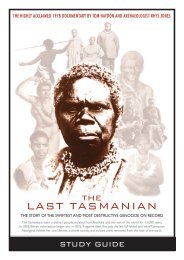
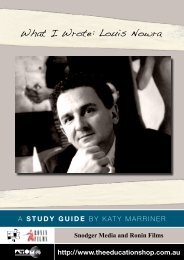
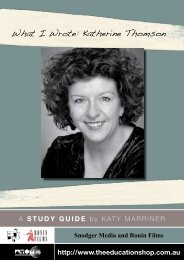
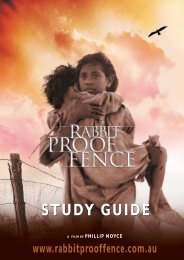
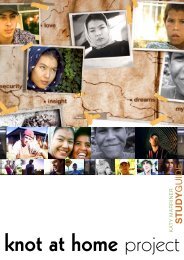
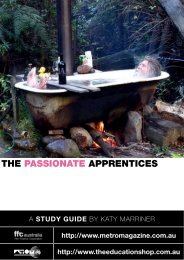
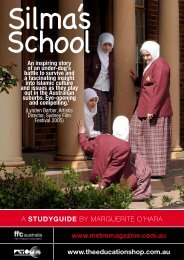
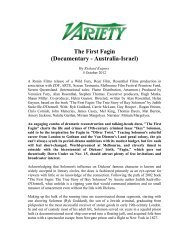
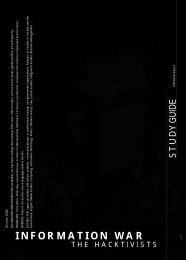
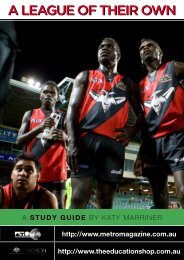
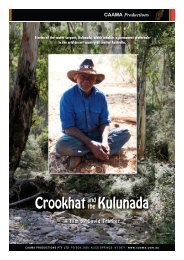
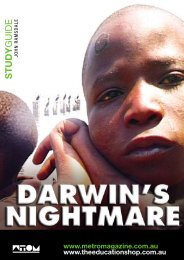
![to download FROHE OSTERN! [HAPPY EASTER!] - Ronin Films](https://img.yumpu.com/33740736/1/184x260/to-download-frohe-ostern-happy-easter-ronin-films.jpg?quality=85)
